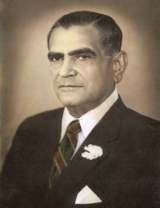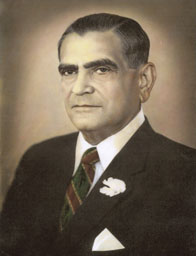
Akhter Husain
Encyclopedia
 |
|---|
Akhter Husain (Urdu
Urdu
Urdu is a register of the Hindustani language that is identified with Muslims in South Asia. It belongs to the Indo-European family. Urdu is the national language and lingua franca of Pakistan. It is also widely spoken in some regions of India, where it is one of the 22 scheduled languages and an...
: اختر حسین) , HPk, OBE
Order of the British Empire
The Most Excellent Order of the British Empire is an order of chivalry established on 4 June 1917 by George V of the United Kingdom. The Order comprises five classes in civil and military divisions...
, (1 March 1902 - 15 July 1983) was an eminent senior statesman and civil servant of Pakistan
Pakistan
Pakistan , officially the Islamic Republic of Pakistan is a sovereign state in South Asia. It has a coastline along the Arabian Sea and the Gulf of Oman in the south and is bordered by Afghanistan and Iran in the west, India in the east and China in the far northeast. In the north, Tajikistan...
. He was appointed Governor of West Pakistan
West Pakistan
West Pakistan , common name West-Pakistan , in the period between its establishment on 22 November 1955 to disintegration on December 16, 1971. This period, during which, Pakistan was divided, ended when East-Pakistan was disintegrated and succeeded to become which is now what is known as Bangladesh...
in September 1957 succeeding Mushtaq Ahmed Gurmani
Mushtaq Ahmed Gurmani
Mushtaque Ahmed Gurmani was a Pakistani politician. In his role as Minister without Portfolio he signed the Karachi Agreement of 1949 that established a ceasefire line between Pakistani and Indian areas of Kashmir, which later become known as the Line of Control...
and then continued in office during the regime of General Muhammad Ayub Khan until April 1960.
Early life
Mr. Akhter Husain was born on March 1, 1902 at BurhanpurBurhanpur
Burhanpur is an important city in Madhya Pradesh state, India. It is the administrative seat of Burhanpur District. It is situated on the north bank of the Tapti River, southwest of Bhopal and northeast of Mumbai...
(Central Province
Madhya Pradesh
Madhya Pradesh , often called the Heart of India, is a state in central India. Its capital is Bhopal and Indore is the largest city....
India
India
India , officially the Republic of India , is a country in South Asia. It is the seventh-largest country by geographical area, the second-most populous country with over 1.2 billion people, and the most populous democracy in the world...
) and received his early education from Hakimia High School, Burhanpur before proceeding to MAO College at Aligarh (see Aligarh Muslim University
Aligarh Muslim University
Aligarh Muslim University ,is a residential academic university, established in 1875 by Sir Syed Ahmed Khan as Mohammedan Angelo-Oriental College and later granted the status of Central University by an Act of the Indian Parliament in 1920...
), graduating later from Allahbad University. He was selected for the prestigious Indian Civil Service in 1924 and completed his education and training at St. John's College, Cambridge, England. Upon return from England, he was posted to serve in the province of Punjab in 1926. He served in various administrative positions in different districts of the province, before being appointed as Under Secretary in the Government of India in 1930. He returned to Provincial administration in 1936. Mr. Husain received a British Govt. award of O.B.E. for his ground breaking work of settlement in the district of Gurgaon in the Punjab in 1943. He was appointed Chief Secretary in the undivided Punjab in 1946, a position he occupied during and until the partition of India.
Pakistan Government Service
He continued to serve as the Chief Secretary of West Punjab in the newly formed State of Pakistan in 1947.The years immediately following the creation of Pakistan were fraught with many problems not the least of which was the settlement of the influx of refugees from across the border from India. Mr. Akhter Husain was appointed as the Financial Commissioner in charge of the resettlement of refugees and the revenue and administrative issues involved therein. This massive project notwithstanding, he was appointed to various commissions and inquiry committees during this period, some of which require special mention here. He was appointed chairman of the committee for the implementation of Lord Boyd Orr’s recommendations on agricultural reforms, member of the Tenancy law inquiry committee, and as consultant of the reorganization of Karachi administration. In 1954 he was transferred to Karachi and took over charge as Secretary, Ministry of Defence
Defence Secretary of Pakistan
Defence Secretary of Pakistan is the highest bureaucratic position within the Ministry of Defence of Pakistan. Following is the list of the defence secretaries to date....
in the Govt. of Pakistan. In the same year he was appointed as chairman of the One-Unit secretariat committee, and the following year as the Chairman of the Karachi Administration committee. He traveled to the United States with the prime minister’s delegation in 1957 and visited some defence facilities. On his way back to Pakistan he received the news, that by common consent of all political parties and the government, he had been appointed as the Governor of West Pakistan.
Governor
Mr Husain was appointed Governor in September 1957 and remained in this position following the imposition of Martial law in Oct 1958. In the same year he was appointed Chairman of the Land Reforms Commission and provincial administration committee. In 1959 he was awarded the high civil award of Hilal-e-Pakistan. He also laid the Pakistan Day Memorial foundation stone (now known as Minar-e-PakistanMinar-e-Pakistan
Minar-e-Pakistan is a tall minaret in Iqbal Park Lahore, built in commemoration of the Lahore Resolution. The minaret reflects a blend of Mughal and modern architecture, and is constructed on the site where on March 23, 1940, seven years before the formation of Pakistan, the Muslim League passed...
) in the then Minto Park in Lahore on the 23 March 1960.
Later years
In 1960 after his governorship, he was appointed as minister in the Presidential cabinet successively holding the portfolios of Information and Broadcasting and then Education and Kashmir Affairs. In order to hold these quasi-political positions, he retired from the Civil Service. He was also the recipient of the honorary degree of Doctor of Law from the University of the Punjab.He was subsequently appointed Chief Election Commissioner between 1962-1963. He also held the office of President of Anjuman-e-Tarriqi-Urdu (The organisation for the promotion and deveopment of the Urdu language) from 1962–1983 and was Chairman of Pakistan Burmah Shell from 1968 until his death in 1983.

